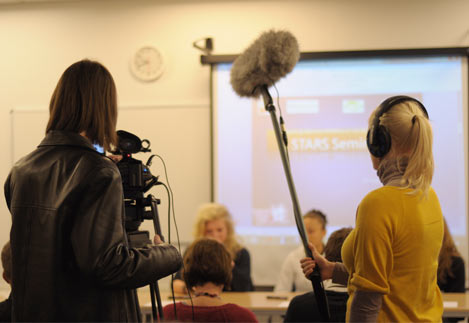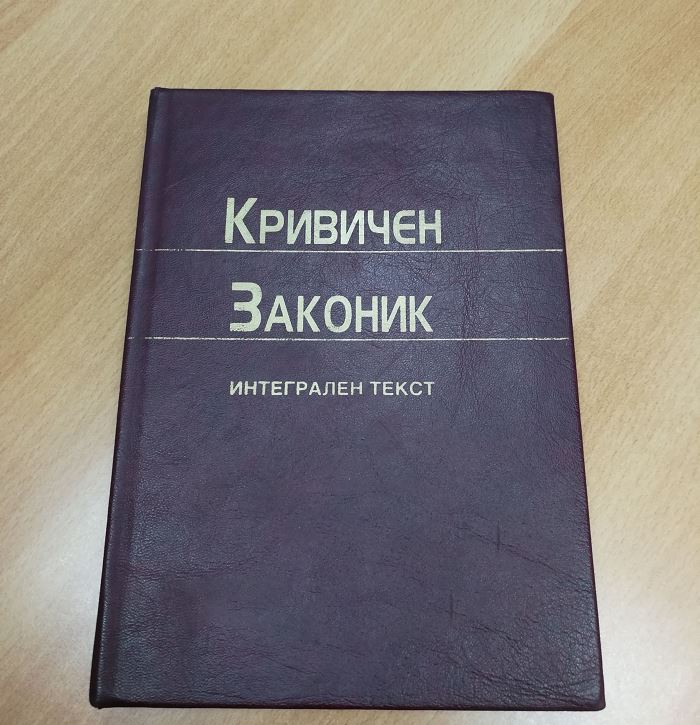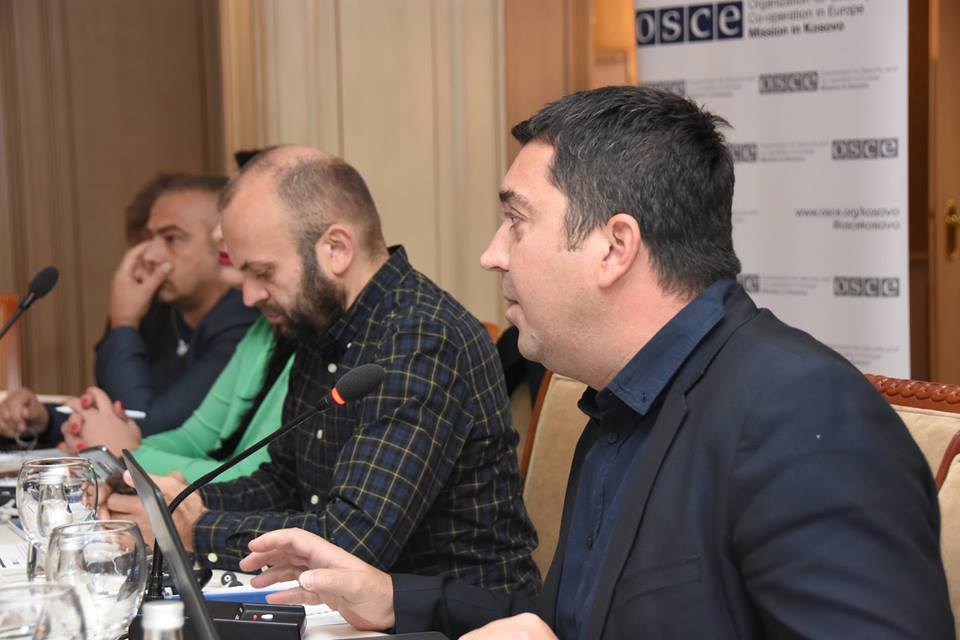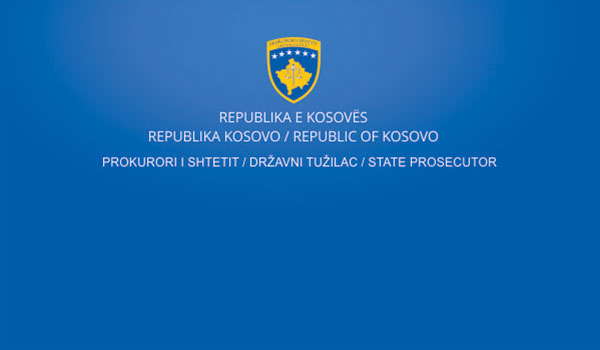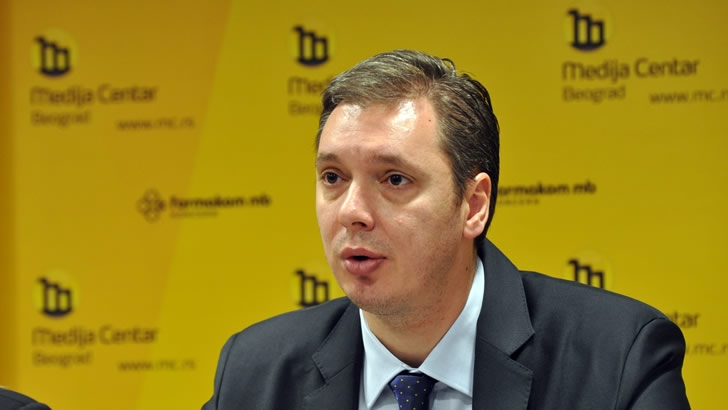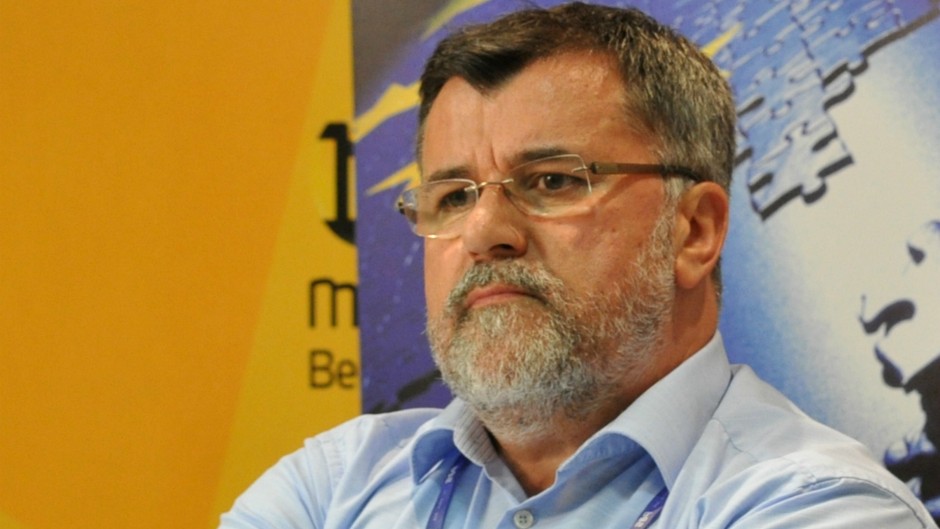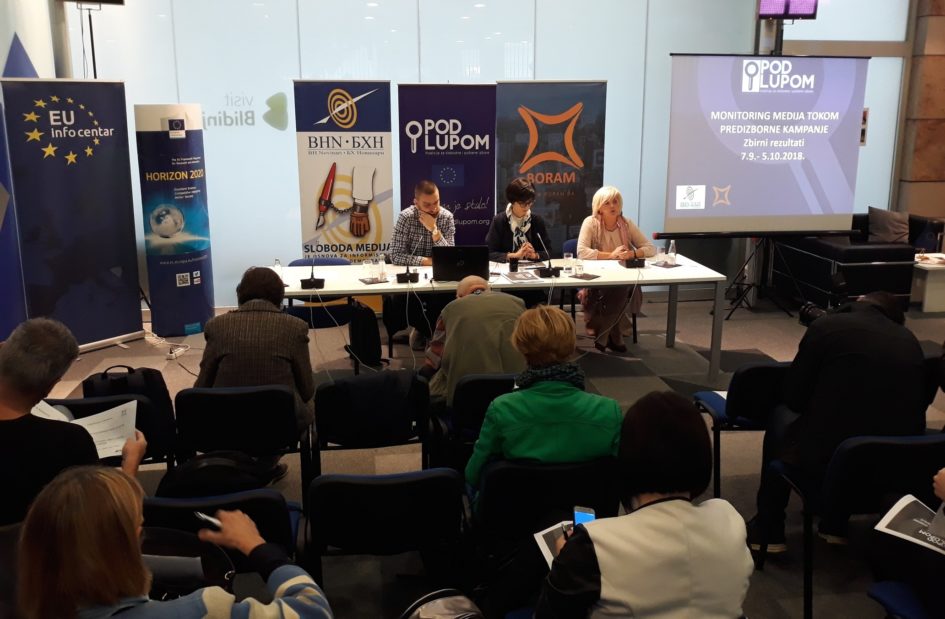BELGRADE, 19.10.2018. – The president of the Commission Investigating Murders of Journalists, Veran Matic, explains his initiative for introducing security assessments of threats against individual journalists.
Matic told Cenzolovka in an interview that he has relayed his concern both to them and to those who, according to their job description, should react.
He says the security assessment is a matter of free choice of journalists, and from his own experience, he stresses that he would never impose life under police protection on anyone.
Among journalists, consensus can only be possibly reached about the fact that the profession of journalism in Serbia has long been unsafe. There is no consensus on what can be done about this issue, and this debate can be burdened by suspicion and reservations, especially toward the initiatives that involve the state being more actively involved in improving the safety of journalists.
Thus, was the first reaction to the proposal of Veran Matic, the president of the Commission and a member of the Standing Working Group on Journalist Safety, to, for preventive purposes, carry out security assessments for prominent investigative journalists.
Can the state at all – from which some journalists believe the greatest danger emanates from -succeed in reducing or eliminating security risks, is only one of the dilemmas that Matic’s statement has brought up to the fore.
We talked with Veran Matic about his proposal, what motivated him to come up with the idea of a security assessment, how it would be done, and how the possible measures would affect the life and work of the journalists themselves – and whether there is a chance that the journalistic guild might still accepts his idea.
“I did not present the proposal to do security assessments just like that,” Matic said in an interview with Cenzolovka. “My assessment is that until now we did not have any preventive activity. I also encountered a caricature of warnings that there are problems and serious threats. And then in the region and in the EU, murders are happening every few months, including the killing of journalists who are part of international research networks, whose representatives among us most are also among those most exposed, when it comes to direct threats, satanization, etc.”
Cenzolovka: You submitted this proposal to members of the Standing Working Group on Journalist Safety last week. What was their reaction?
Matic: Based on the reaction of SWG members and part of the public, I realized that it was possible that some of the misunderstanding was due to the fact that I proceeded from my own experience of a person who was under (police) protection. Obviously, it was necessary to explain in greater detail what I meant by this. I think that the members of the group have been a little startled, someone immediately thought about police protection, while the police representative was surprised and suggested that we bring an expert from the MUP (Interior Ministry) who would explain how, and in what situations the security was done.”
When I speak about security assessments, I speak from the perspective of someone who has had the experience. The life of Brankica Stankovic, and my own life. The lives of our families have been seriously underminded by the police protection. I would wish this on anyone. And I would not impose life under police protection onto anyone.
What happened to us is irreversible, we cannot fix it in any way. I could be the first to be very angry at those who evaluated my security. But I can never be sure whether this has prevented the endangerment of my life or the life of Brankica Stankovic. What we could see from the documents was very worrying.
Cenzolovka: One of the public’s doubts is whether the security assessment would be done in cooperation with journalists or beyond their knowledge.
Matic: Security assessments for Brankica Stankovic and myself had been done without our knowledge. They were not even security assessment, but a reaction to a direct threat that appeared in communications.
If we are looking for a security assessment for some of our colleagues, then that’s not the same. We want to check the state of security. It is determined by looking at all the essential information that exists in the activities of security institutions at that moment, and in some period for which a security assessment is required.
We always have options, we do not have to ask for an assessment, we can collect data and say: in relation to these data, we are asking for a targeted security assessment only for this aspect of the activity. We can ask a question in a wide range.
My idea is, if we think that we are endangered as a profession, with all the new challenges or those challenges that are not recognizable among the authorities, it is important to put targeted questions and then later rely on the assumptions and answers of the authorities.
When it comes to the safety of journalists, it is impossible to perform any kind of work only on behalf of institutions or on behalf of journalists only. Close cooperation is necessary, and if that is lacking, as well as trust, then it is meaningless to work on common models.
I think it was important to create an operational apparatus that will be available 24/7 to any journalist and media worker, with a strong lawyer support, which would encourage every kind of reaction, and provide guaranteed free endless legal support.
Some associations did not want institutionalization. I think that this is still an unsolvable problem, regardless of the defrosting of the participation of associations in the working group for security.
Cenzolovka: If your statement has faithfully transmitted in an interview with B92 – that assessment would only be done for “prominent investigative journalists.W Is there a particular reason why you just set them apart?
Matic: When I spoke about “prominent investigative journalists,” I spoke in a symbolic sense. From there, it is certainly necessary to start with a security assessment, as this is about colleagues who we know often manage both teams of colleagues locally and throughout Serbia, and they know best who should be part of some kind of security assessment in their teams. Of course, I do not think that this type of prevention should be restricted to them exclusively.
One out of the four murdered journalists in the last year, we know that three people were killed while working on topics concerning international corruption, EU fraud… They worked within international networks of investigative journalists who are not fully recognized as media journalists. After all this, either we can be silenced or say that we are concerned about the Serbian versions of Daphne from Malta, Marinova from Bulgaria or Kuciak from Slovakia.
For the murder of Daphne Caruana Galizia, the liquidation was being prepared for a long time through intimidation placing a fire in a family house, through 57 court lawsuits, frozen bank accounts, arrests, and tax administration inquiries. Everything went unpunished.
For a long time I have been investigating the killings of journalists and I understand how important the impunity for the murders of journalists and for the prevention is. Prevention makes sense if it is done so that the worst, murder of journalists, does not occur. My suggestion is that we use much more energy for the prevention, before anything more serious happens.
Cenzolovka: Did you have in mind any particular danger for any journalist?
Matic: I am very concerned about very specific journalists. And I also told this to them, and those who, according to their job description, should react. And to determine if there are reasons for my concern. I think it’s better that I raise am alert and make a mistake, than for something bad to happen to to sombody. And I have some personal experience as a form of credibility.
Anna Politkovskaya’s husband once told his wife that what she did was doing was “an alarm for justice, no for journalism.” And, unfortunately, with her cruel liquidation an alarm occurred, that her case is an alarm for the impunity for crimes committed against journalists.
It’s not only investigative journalists that are the possible targets. We see violence against journalists working for local newspapers, website, regional agencies… We need to talk about each case, as well as about preventive initiatives.
Cenzolovka: Can you explain – who and on what basis nitiate assessments and how are they performed? Are journalists’ fears that they themselves, or their communications, could be “under control” and that, inter alia, their communication with the sources would be jeopardized are justified?
Matic: When I presented my proposal, I immediately thought of the most drastic form of police protection and the story of the sources, etc. And I did not think about it at all, because it is the most drastic form of protection that does not come out of the proposed safety checks – it happens when certain information is given for urgent reactions.
My idea is that associations and legal teams that defend journalists say what their assessments are to the degree of the vulnerability, threats, ranks… to show who are the most vulnerable journalists and editors, or leading people in an association. The degree of threat and impunity tells us that there are potentially more drastic activities. Do security institutions have a similar or different view?
The amount, the drastic nature and the frequency of threats to Nedim Sejdinovic… I did not count, but I think he is among the most exposed. And the entrance to the space in which he works (the Independent Association of Journalists of Vojvodina) makes him exposed to frequent defamation.
Very frequent threats filled with hate speech carry with them a lot of aggressiveness on various topics, from the counting of blood beads, the appearance, the stereotype of the politics they represents, the mercenary… they by themselves they also produce their own concerns.
When a similar rhetoric is added to some of the representatives of the authorities at official forums, an “explosive mass” is obtained for the potential reaction of someone who has mental problems, someone who wants to prove himself as a “patriot”, someone who would design to further damage the state image on purpose.
If such condensed information shows the repetition of certain matrices, I believe that a more serious control of the entrance to the premises should be introduced, in order to identify and sanction those who destroy the board at the entrance and the entrance itself… And to determine who these people are, maybe representatives of groups that generally represent a social danger.
If it were found that there is a threat to personal security, there are a number of options – avoiding situations in which an attack could happen, engaging private security… I believe that support of various organizations dealing with journalist safety will be provided (for more drastic cases they also have safe houses). Only in the drastic form of the threats, police protection is imposed.
There is always a possibility to refuse police protection, and then the system must find a way to protect the life of the journalist. This means that the protection would not be personalized to a single bodyguard, but there would be greater number of actors involved, from a greater distance, less noticeable.
Security assessments, in a way, also trigger the institutions of the system to think in these categories, they are bound to do that.
|
EXAMPLES OF SWEDEN AND THE NETHERLANDS
Last year, Sweden adopted the document “Defending Free Speech” and based on it: “Measures to protect journalists, elected representatives and artists from exposure to threats and hatred”.
An analysis was made on the degree of spreading hatred and threats towards all participants in public communication, a high level of concern that creates a threat to the social climate, and a number of measures to prevent, halt the process were implemented. (They recognized the changes in the nature of the media, technologies, the new role of social media, citizens-journalists, changes that have brought about the migration of the population, etc.)
Amendments to the law in several areas were proposed, along with the introduction of new criminal offenses, and tightening of the penal policy. And this is being realized. And in Sweden we have several journalists under 24/7 police protection, several journalists in safe houses, increased police attention towards some media outlets … I think that’s the right path.
I do not believe that through the process of writing a media strategy or through the negotiations of the Team for the negotiation of journalistic associations with representatives of the Government, such a direct, comprehensive approach will come. None of the processes were preceded by a high-level, highly-qualified analysis of the situation to be solved by strategy or negotiation.
In the Netherlands, representatives of the Association of Journalists and Police assessed that there are serious threats to reputable journalists and editorial staffs, and made a report called “The Hostile Climate”, from which they came to the conclusion that threats can lead to journalists avoiding certain topics. They made a Working Group on Aggression and Violence Against Journalists, similar to our Permanent Working Group…
If such a long break was not made in the work of the Permanent Working Group on Journalist Safety, I believe that we could have the necessary analyzes and proposals for preventive measures to date. Some associations are still expected to unfreeze their membership in this working group.
|
Cenzolovka: Institutions of the system that journalists do not trust too much…
Matic: Since I see that there is opinion that the institutions of the system pose the greatest danger to journalists, it would be worthwhile to argue such claims well and find a way to get a credible security assessment team.
Naturally, it is always possible to engage experts who would gain confidence, there are also authorized agencies, there are international experts. It is possible to agree on the creation of our committee to protect the safety of journalists (such as the US Committe to Protect Journalist), we can create an expert security team, etc.
When it comes to the strategies that will protect the safety of journalists, security protection 24/7 is not the only possible solution. It is possible to perform surveillance that would represent protection only in certain situations that can be assessed in advance as security risk, or only on certain locations …
Of course, it is also possible to refuse any police protection. But it is clear that it is very important that we all together document an estimate that something bad can happen to our colleagues.
When it comes to how in these circumstances it is possible to meet with the sources, I believe that you should talk to Brankica Stankovic and her associates. I think that the management of B92 has found an excellent mechanism to enable the evolution of investigative journalism, regardless of the new limiting circumstances (we strengthened the research team, performed the redistribution of assignments, Brankica focused on editorial duties, and we increased funds provided for the work of the editorial staff).
On the one hand, we had state security mechanisms, and on the other – ours mechanisms. All this was a very complicated experience because we did not have a role model to adhere to, but we managed to preserve our lives, regardless of the estimates that did not come only from the police.
When a similar rhetoric is added to some of the representatives of the authorities at official forums, an “explosive mass” is obtained for the potential reaction of someone who has mental problems, someone who wants to prove himself as a “patriot”, someone who would design to further damage the state image on purpose.
The manner of organization and functioning within B92 (and what we did internally in order to do our job in a normal and undisturbed manner) was described in detail by Brankica Stankovic in the book “Insider, My Story”.
Cenzolovka: When some and only investigative journalists publicly express distrust towards the Ministry of Interior, which should carry out the assessment, they are reasoning that the greatest danger threatens them precisely from the state, that is, its officials, most of whom are campaigning for slandering and targeting, and their media satellites that spread these threats. Are the journalists most at risk from the state and what other threats are they exposed to?
Matic: Investigative reporters should present their own position and possible solutions to the problems of threats and pressure, whether they come from the representatives of state institutions, whether they come from mentally challenged persons filled with hatred, or some third party.
Of course, the most disturbing ones for me are coming from the representatives of the executive and legislative authorities and representatives of the relevant institutions, because they should all work impartially and in the direction of creating a democratic society, based on the basic postulates of democracy, freedom of the press, freedom of speech.
As far as security is concerned, I would like to hear the suggestions of investigative journalists to improve their safety in practice. As well as to see what are the possibilities in specific cases. If there is no trust and desire to work on securing safety, then we probably should not waste time. And that solutions are being sought at completely new levels.
I would prefer that in the bodies dealing with the safety of journalists there are journalists who are directly exposed to security risks, campaigns of slandering and targeting, and not only representatives of the association, because I believe that we would be more productive then.
It is extremely important to create a social climate, and our country is strongly politically polarized. Hate speech, threats, creation of intolerant climate, cannot be otherwise prevented except by the social agreement of the main actors.
I am the first one who could be very angry at those who assessed my security. But I can never be sure whether this has prevented the endangerment of my life or the life of Brankica Stankovic. What we could see from the documents was very worrying.
Cenzolovka: What do you expect will happen to your initiative?
Matic: It would be first necessary within the media community to talk about the safety of journalists. I have the impression that, in spite of the fact that this community is disunited, those who could be endangered do not have much confidence in the associations.
It would certainly be important that an initiative be launched from those who are systemically threatened. I mean the trend we are talking about, which is dominant in Europe.
Then, there are those journalists and news desks that do not belong to the research group, but are under the pressure of a wide range of hindering work, endangering the existence…
When it comes to the Permanent Working Group, I think that for some time, working procedures and rules and the like will be more important, and that we will be waiting for some consensus on this topic.
I think that it is not so difficult to create a national consensus that there should be technical coordination of all activities that should help create the conditions for prevention. That the competent legal team is working on the SOS phone which is connected with direct communication lines with representatives of the prosecutor’s office, police, journalistic associations…
With strong legal support, which is free. With clear recommendations on what each journalist should do if he gets threats, if he encounters problems, etc. This can be done by a completely new agreement on the basis of which the Permanent Working Group was established, but I do not see the necessary interest.
Then, by establishing an institution of Protector of journalists who would function independently in relation to the government, by creating a committee to protect journalists, which would create a professional consensus on threats and security, with independent sources of financing of all aspects and assessments of security, protection, safe houses, etc.
I think that each of these options could be easily and quickly realized if there was an agreement between journalists, associations, etc. Then, an agreement with representatives of the authorities, and with representatives of the international community…
This is a unique moment. If it is missed, it is possible that we will get into the situation of Hungary or some other country that has become full member of the EU, and that there are no more convincing ways to create mechanisms and institutions that will guarantee the safety of journalists, more than usual, more than average.
 This article has been produced as a part of the project Western Balkan’s Regional Platform for advocating media freedom and journalists’ safety with the financial assistance of the European Union. The contents of this article are the sole responsibility of the Independent Journalists’ Association of Serbia and its authors, and can in no circumstances be regarded as reflecting the position of the European Union.
This article has been produced as a part of the project Western Balkan’s Regional Platform for advocating media freedom and journalists’ safety with the financial assistance of the European Union. The contents of this article are the sole responsibility of the Independent Journalists’ Association of Serbia and its authors, and can in no circumstances be regarded as reflecting the position of the European Union.

